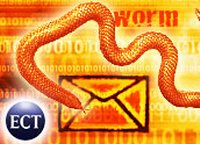Sober is not scary! We are ready
 Security experts say that network security administrators need not worry about the Sober virus outbreak that was predicted and early January 2006, so be prepared to take precautions and remove computers. has been infected out of the system.
Security experts say that network security administrators need not worry about the Sober virus outbreak that was predicted and early January 2006, so be prepared to take precautions and remove computers. has been infected out of the system.
According to security firm McAfee, if Sober's attack took place as expected, the consequences would probably be greatly reduced because we knew its roots.
Because only systems that have been infected with a Sober virus variant can update and initiate the attack of the latest variant on January 5, 2006. If these systems were warned and eradicated the infected variant before January 5, 2006, the attack would surely be fruitless.
McAfee said administrators have a very long time and have been warned to clean up their systems. However, the company also warns that we should not underestimate this issue, but we need to be prepared for every situation.
"The worst case scenario is that systems must not wipe out Sober variants and make the attack outbreak and spread strongly."
Finnish security firm F-Secure also stressed the importance of this issue. 'Let's see Sober.Y - Sober's latest variant under the naming of F-Secure - has exploded strongly in the prime time. The virus still accounts for 40% of all virus messages sent to us. We should be careful. '
iDefense, on the other hand, warns about a chain-effect situation when systems that have been hijacked by hackers send email with Sober's variant everywhere.But once the network has been scanned and cleaned, it is quite simple for us to filter emails with viruses and will help us limit this new attack.